Grant for Jam: How a "Yummy" Business Established Itself
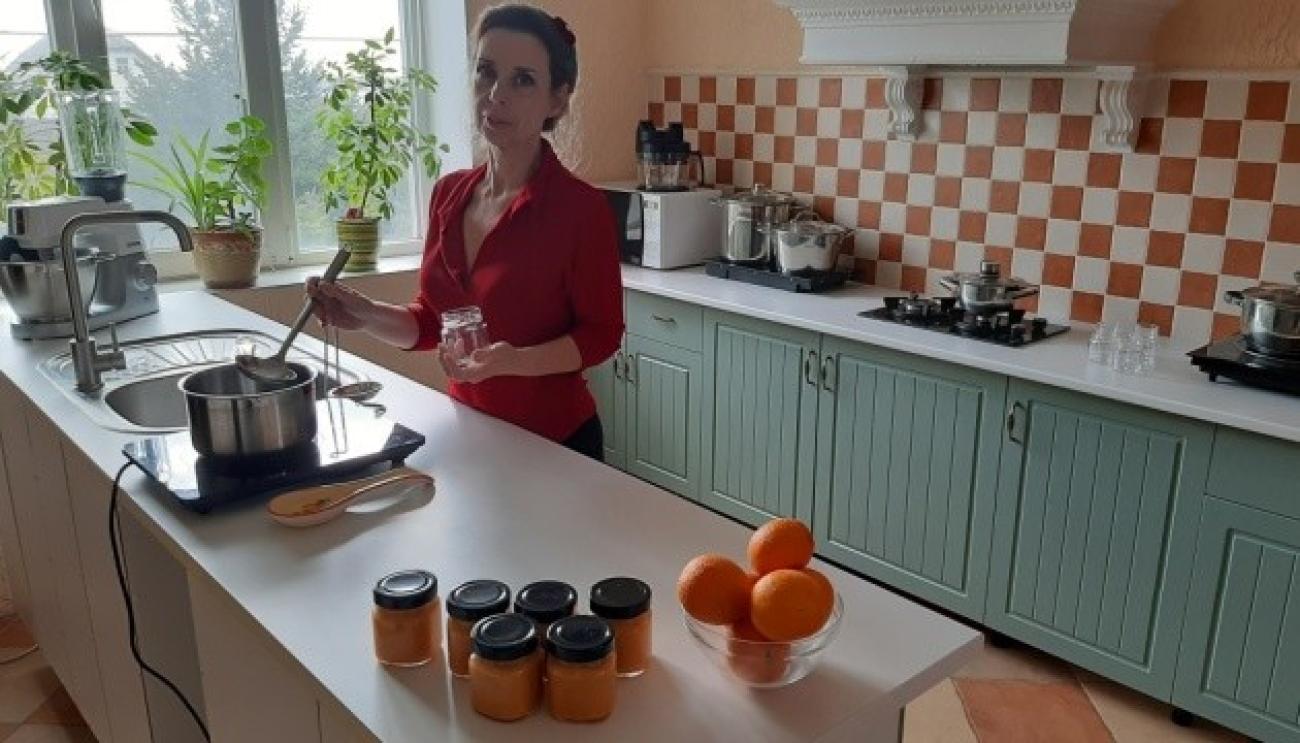
Former journalist Olesya Markitan decided to change her life and opened a jam business with the help of Local Employment Partnership project.
Kiwi fruit with strawberries, melon with garlic and pickles "the American way" - it took a year and $3,000 for them to appear in the kitchen of a craft delicacy manufacturer.
In the Kherson suburban village of Antonivka, Olesya Markitan's kitchen is awash with sunlight; on the shelves, there are jars with jams and sauces, and even vinegar is curious to look at because it is infused on herbs. A little later I will be choosing a sauce – spicy orange-and-ginger or cherry-with-wine – picturing how, on a cold winter night at home, I will open a jar or apricot-and-kiwi fruit jam, or maybe that one, with dried melon; or should I try grape jam? we are in Kherson area, after all…
The decade-long hobby of an ex-TV journalist grew into a business during the most difficult times of the coronavirus epidemic. It took a bit of magic (that is how they cook jam or sauce, don’t they?), support by her family and also, a project by the Local Employment Partnership, which has already given a chance to 18 business initiatives operating in the area of tourism.
FLOWER AND "ANGEL" JAMS
Olesya Markitan had worked for twenty years in information journalism; among other things, her creative background also includes her own TV cuisine project. She always loved to cook, and she drew inspiration from her trips abroad, where she found unusual recipes. "From Turkey, for example, after I talked to my colleagues there, I brought a recipe for an extremely tasty jam with name that does not sound very culinary: "Angel Hair"; I simply call it Angel Jam. It is made from Spaghetti squash and has a peculiar structure, so when you taste it, you will never guess it belongs to the cucurbit family,” Olesya says.
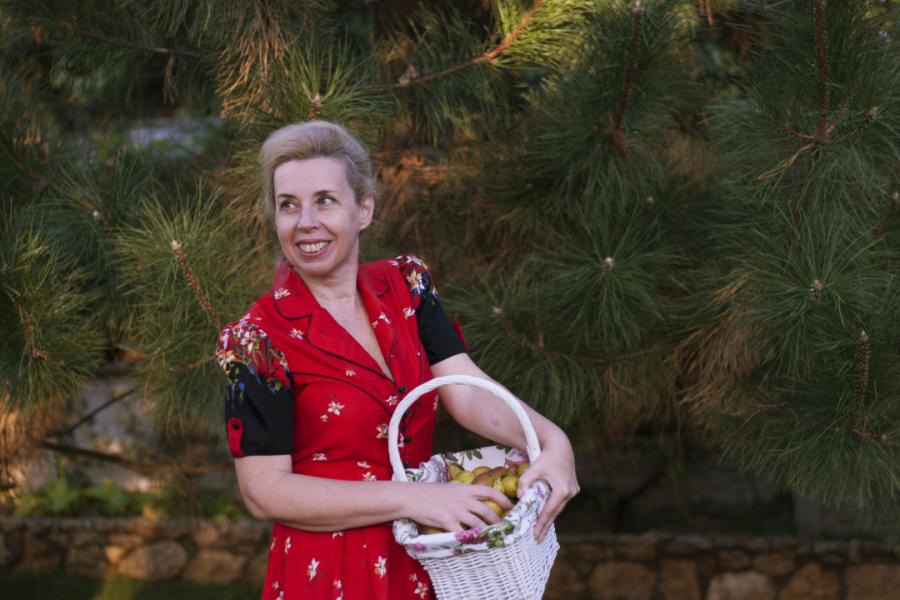
She tells that while working as a journalist, whenever she had a day off, she would spend it in the kitchen, treating friends and relatives to all sorts of yummy things.
And then she realised that she was no longer interested in journalism, that she grew very tired, and that she had to ‘walk out of the frame’ in time and spend more time with her family. Even her son grew up, as it turned out, without her and her husband, just with his grandmother.
"I left television and, for the past ten years, I have been cooking jam. I boiled any flower I could find, all sorts of vegetables and fruits, combining various flavours. In a while, the rows of jars of jam began to annoy my family - “we do not eat so much confectionery” – but my cooking went on and on and on…”, the woman says. The pandemic became the turning point; she decided to take a chance and either get a new profession or find money to start a business through the Employment Centre. "The Centre said that the programme was no longer active, but while being there, I heard about the Local Employment Partnership project - an inspector who happened to be nearby was telling someone about the possibility to receive a grant, and I wondered why they did not offer that option to me. I had to tell my inspector that I was also ready to join that project,” Olesya shared. And that was the right thing to do.
The Local Employment Partnership is a project that brought together civil society organisations, Employment Centres, and employers to promote self-employment and support small businesses. One of the areas of its activities is the "Start and Improve Your Business" programme. It envisaged a contest of business ideas and provision of technical support, in the amount of $3,000 (in hryvnias), from the International Labour Organization for the implementation of people’s own businesses. That was the programme our character took part in.
First, there was training – they immediately had to write a business plan that they needed to defend. Olesya had some ideas. She presented her jam business plan, and she also had one more, which she did not submit but implemented nevertheless – "The Crazy Plum" (dried plums with Kherson-specific components added, such as "Lemurian" salt).
All project winners received the USD 3,000 worth of equipment that they needed for their businesses. Olesya, for example, bought a refrigerator, a dryer, induction cooktops, a dishwasher and some special utensils. Although, she says, she had “grown out” of those pans and dryer as soon as a year later, because her operation kept growing and she has many plans.
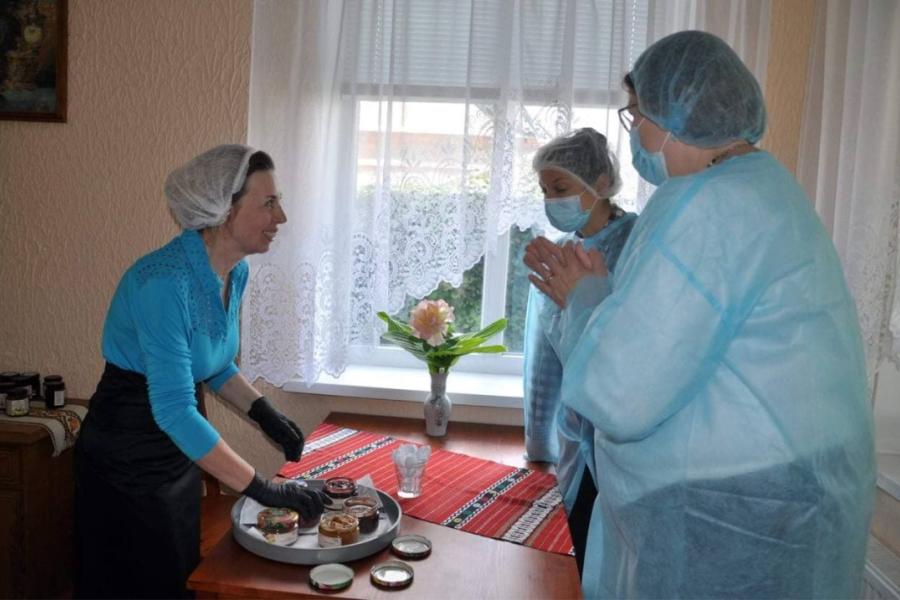
RAW MATERIALS FROM THE LOCAL MARKET, SPICES FROM ISTANBUL
Almost everything that gets into jars with jams and sauces is bought from local farmers. Last year she used to shop in the city marketplaces, but those were expensive. This year she travels to the largest wholesale vegetable market in the south of Ukraine, in the village of Velyki Kopani. She negotiates with the farmers to drop the raw materials at her place, although there is a problem: she buys by the kilogram, and they are accustomed to selling by the tonne. “Farmers ask me sometimes: how many tonnes are you taking? And I say: 50 kilos. I have to use my journalist connections, to persuade them. Sometimes they haul big loads and drop a little at my place,” she says. She buys some spices in Istanbul, combining travels and procurement.
In addition to dried plums and jams, she created one more product line - spicy berry sauces for meat and fish. Since she wanted to do something special, however, she started using the hottest pepper varieties. Last year, she bought very expensive seeds, and then realised that she herself could not be able to harvest, because she has only the experience of a summer vacation gardener, so she gave those to some women she knew. They cultivated the seeds and in autumn brought her the harvest - she paid for that, and everybody won.
Herself, she says, she grows the Spaghetti squash and basil, and this year she did try growing hot pepper.
“May to November is the gathering time, I have a blank, and jam sales are practically absent. Sometimes it happens that everything ripens all at once and I ger overwhelmed with panic: how do I cope? I can buy everything but then I have to process it too”, Olesya shares her difficulties. “Last year I had nobody to help me, I could not afford any assistants. Two or three times I hired people to do the dirty work - wash, unload, clean strawberries. At the end of the day I sat down to do some calculations and they made me cry – it was unprofitable." Winter is psychologically easier, since sales are good. And the time to relax is April, when there are no orders to speak of, or any special work. "I sometimes complain that not everything works out, but if you swipe away these emotions - I only registered on October 1 last year - I recollect how much I did, and, as it turns out, I did a lot," the master confectioner says.
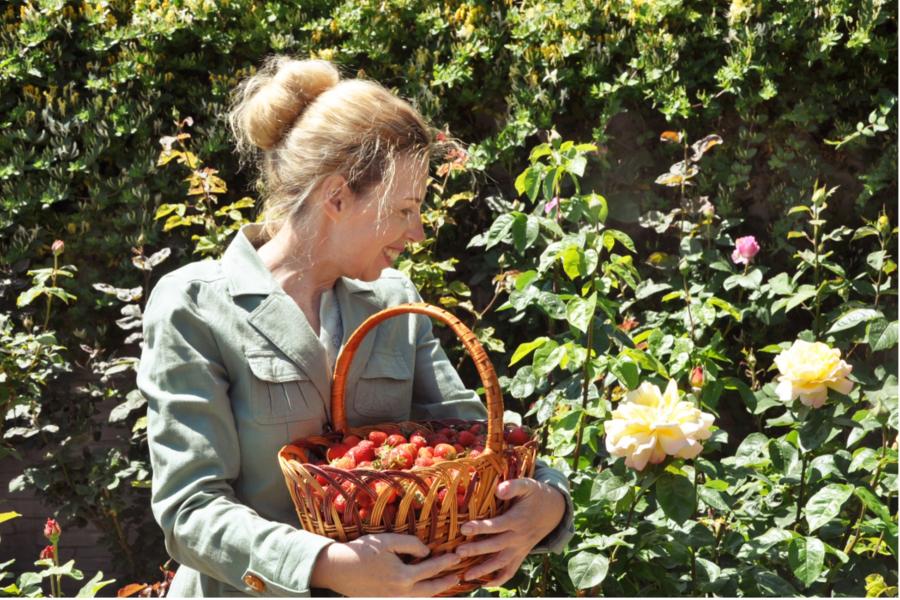
A year ago, when she started, she regarded an order for 15 to 30 jars as a great success. Now she delivers an average of 2,000 jars of sauces and jams every month. Those are mostly corporate orders - companies buy those as a gift to employees or guests to the region. That is why she works a lot, 16 to 18 hours a day. And that's not the limit: next year she plans to add canned preserves, and this summer she made some test products. Some more work, and she will have “pickles the American way” (the kind that are used in burgers), with spices. “My family liked them. Now I need other people’s critique. I also want to make dried vegetables for soups and borscht,” she shares.
Apart from jams and sauces, she has another schtick – she conducts master classes with tasting for small groups. “In summer, I conduct those master classes outdoors, in winter – in here, for no more than four persons. Girls order a tasting session for their birthdays: we cook a ‘designer’ jam, they socialise, and it turns a nice celebration,” she says.
PLANS FOR EUROPE AND CREATIVITY
She has actually crowded out her family from the first floor of her house, and plans to have a workshop and a storage place next year, because her ambition is to enter European markets. To do that, she must take part in international fairs and, of course, to make sure that her production facility is certified by the European standards.
"I have to scale up. I did some calculations: with ten workers, I will have a good, solid craft production. Anything more than that is not craft anymore, because there will be no creativity, you will be bound by the process flow chart,” Olesya ponders. So far, her work has offered plenty of space for authorship and creativity. She designs the labels herself. To do that, she collaborates with local writer Anatoly Marushchak and Kyiv-based journalist Svitlana Leontieva who is also a painter. With paintings it is clear - obviously, they can be used in a design. But what does a writer have to do with that? Well, Anatoly simply wrote a fairy tale "Lesya’s Jam", made an audio record of it, and now people can listen to the tale by following a QR-code on the container.
"I will not say that I invent all the recipes myself; as they say, everything has been invented before us. In general, sharing recipes is okay, every cook will eventually make something uniquely theirs anyway. But what does not get shared is the technology, because it is the result of their own work. You come to this through trial and error, your intuition works,” Olesya says. She feels a lack of knowledge, she admits, and she studies all the time. Since the new year, she has taken six specialised courses, but, she believes, that was not enough. Buyers need to be surprised all the time.
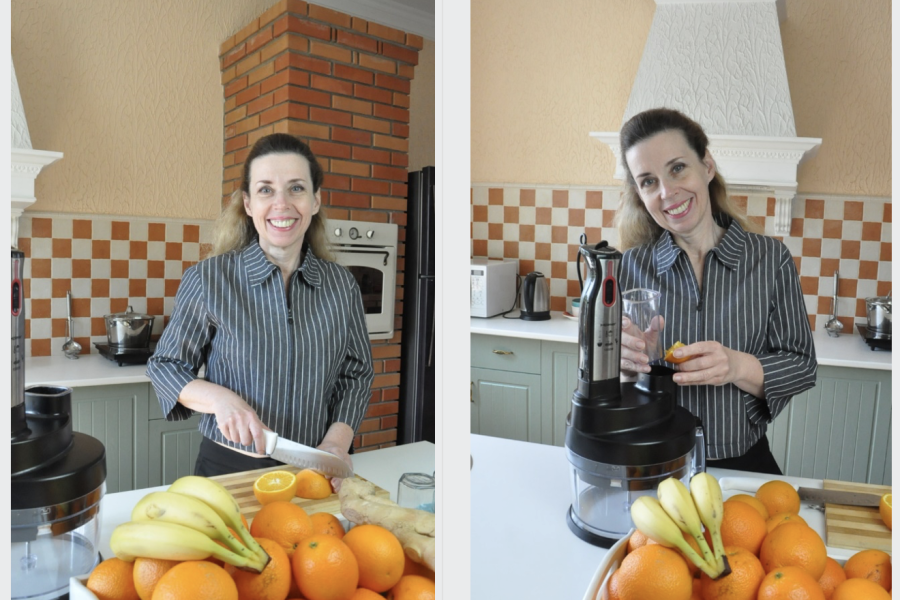
«The most unusual flavours, I believe, are citrus ones. That’s citrus flavours that Kyiv customers buy from me. And myself, I really like kiwi fruit combined with strawberries”, says the author of unusual jams. “I like to read about cosmetics, where unusual fruits are combined. You read that and think: that's interesting, I wonder how will it taste?” Olesya does not cook what she does not understand and does not like. “I don't use cumin, I don't cook pekmez. This year, however, I'm launching two sauces - ‘spicy watermelon’ and ‘garlic melon’. They are sugar-free, even in watermelon I lower the sugar content a little by adding lime or lemon”, the champion of unusual combinations shares. “Last year, I made melon and cucumber sauce - everyone liked it, but I didn't.”
I ask, and what kind jam considers purely Kherson type? According to Olesya, the showpiece of the area is grape jam, although almost no one cooks it (and it’s a shame because it is actually very tasty). The most popular flavours are apricot and cherry. Olesya makes them appear in a new way, with a “kink" - with spices, amaretto, pistachios.
Although Olesya left television, she has projects in mind that are related to gastronomy and tourism - for example, at some point she wanted to tell about famous people who visited the Kherson area and about their favourite dishes. She also dreams that the kitchen, where we talk, will become a living museum of jam - there is an old wooden chest waiting for its time, and a collection of utensils gradually grows.
BALKAN EXPERIENCE THAT WORKED IN KHERSON AREA
Two years ago, a memorandum on the establishment of the Local Employment Partnership (LEP) was signed in Kherson, enabling Olesya Markitan to start her business. That was a case when a memorandum really worked - the project participants’ efforts contributed to the implementation of 18 business projects in tourism; development of a professional standard for cooks; and establishment of a gastronomic laboratory at the Kherson Higher Vocational School.
The LEP, which encompassed 14 civil society organisations, the Kherson City Council, and the Oblast and the City Employment Centres, emerged within the project of the International Labour Organization "Inclusive labour markets for job creation in Ukraine." Communication between the participants and the administration of the project was supported by the "New Generation" public centre, which acted as a bridge connecting all project partners.
According to the "New Generation" Executive Director Oksana Glebushkina, 38 business plans were submitted to the business project contest; 30 business ideas were publicly defended; 18 winners were established and provided an opportunity to purchase the necessary equipment, for 3 thousand dollars each.
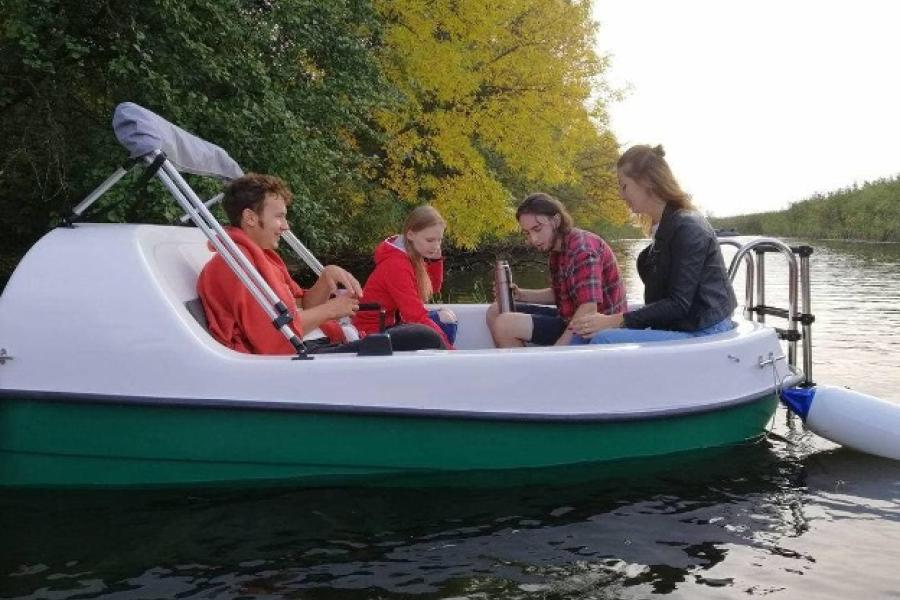
Those included gastronomic business ideas: craft cuisine - specialty jams and preserves, and wholesome bread. There were also projects dedicated to water recreation: SUP paddleboarding, rides in eco-boats (electric catamarans) and kayaks. Also, the project helped implement the idea of customised picnics, create specialty board games, and offer virtual tours of Kherson. There was a manufacturing unit as well, offering authentic designer embroidered shirts, camping equipment, and linen clothes; there are plans to make unique souvenirs. Coffee shops and the “CULTURA” fem workshop were supported too.
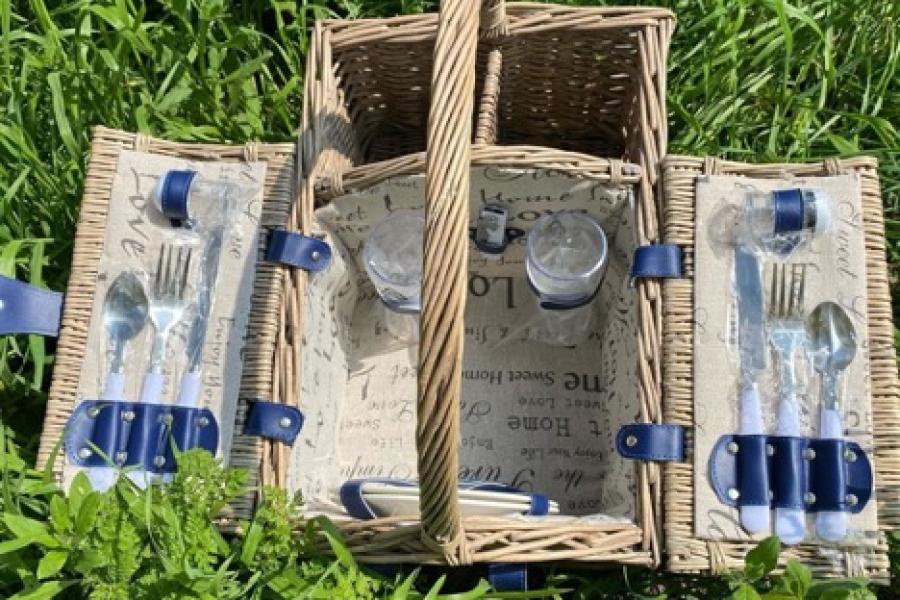
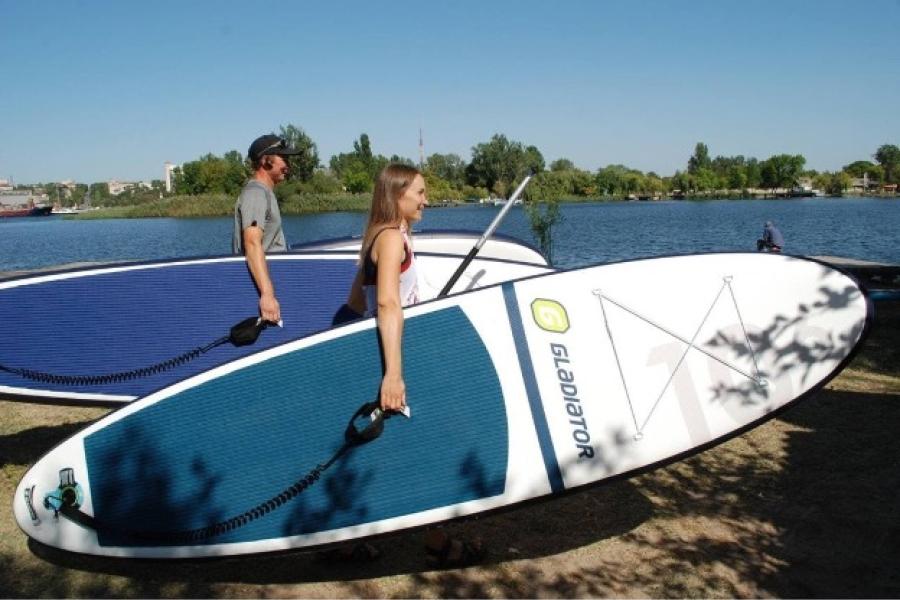
Another area implemented within the Local Employment Partnership project is the support for the long-term unemployed and the inactive population. Experts developed and implemented a methodology to find the reasons for why people cannot find a job for a long time, and held webinars and training sessions for the project participants.
"We were trying to find out why people stay registered as unemployed for a long time. Those include, for example, mothers who stay on the maternity leave - they are able to work, but there are barriers, so those women can neither receive the unemployed status nor work. In particular, those are seafarers’ wives who have the resources to start their own business, but they are economically inactive. Also, an obstacle exists for some young people, for whom applying to an employment centre is equal to acknowledging that they are incapable of self-realisation”, Glebushkina listed some problem categories. Advisers helped develop individual plans and hold webinars (it was a period of quarantine restrictions) for 100 Kherson residents from such groups. As a result, 42 people found jobs. Dzemal Hodzic, Senior Technical Adviser of the International Labour Organization project, even drew attention to the success of the proposed concept and emphasised that the practice needs to be implemented. "The Local Employment Partnership in Kherson is an example of success that must be shared," Mr. Hodzic said. Currently, there are plans to implement the next stage of the LEP, choosing another sector of the economy and another community in the Oblast, Oksana Glebushkina said.
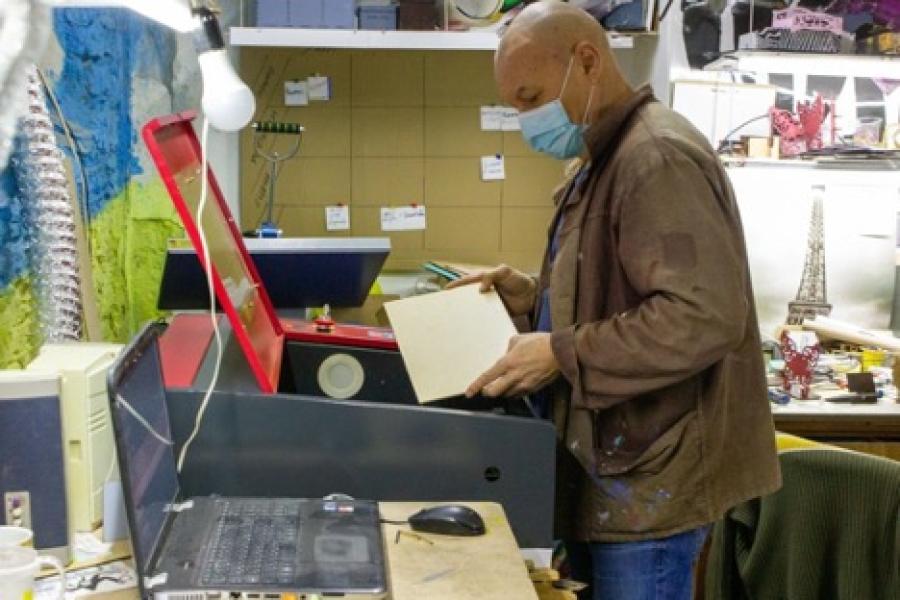
At the end of September, an independent assessment mission of the Government of Denmark and a team of the International Labour Organization visited Kherson. The mission experts had personal meetings with the project participants and members of the Local Employment Partnership. "That visit gave me a chance to see from a different perspective how to continue the project, how to use our experience," Oksana Glebushkina said. She added that the programme trainers and mentors agree that the programme would not have worked if it had no funding, because in fact it was the lack of start-up capital to start a business that deterred people. Currently, all 18 projects are up and running, all registered and operational. The project helped not only those who started from scratch - opportunities were opened for those private individuals who already had a business model and worked, but needed support, Glebushkina explained. For example, the ZAGRAVA project for the production of linen clothes. Its owner, Maria Doiban, used to sit at sewing machine herself, created designs herself, and sold those herself. Now she can hire workers and has enough time to develop and promote her brand.
"We bought equipment - a professional ironing machine and a device that makes buttonholes – and that accelerated the work manifold. From 100 items of clothing over a season, they have grown to 240, using three hired employees during that period,” Oksana Glebushkina described the progress.
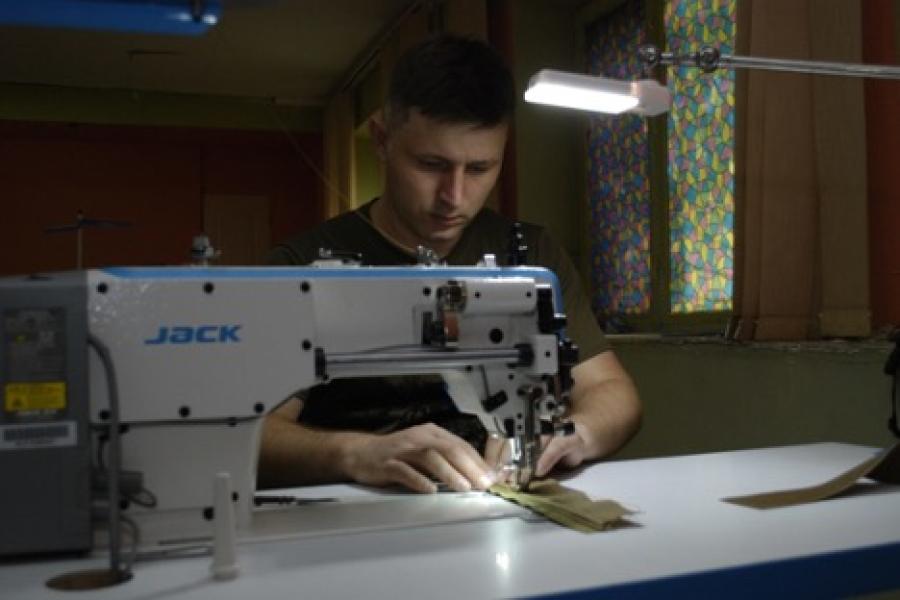
The model that the International Labour Organization put forth and piloted in the Kherson area is the experience of some Balkan countries, tested in those with the EU support. As we can see, it also delivered good results in Ukraine too. In Rivne Oblast, for example, the dairy sector was chosen for a similar project. The lessons learned in Kherson during the project is planned to be used in the small business support programme of the Kherson City Council, the "New Generation" director said. "Of course, it will not provide financial assistance in the form of a grant to buy equipment, as in our project, but it may offer, for example, reimbursement of loan interests, it is envisaged in the programme," Oksana Glebushkina said.
Author: Iryna Staroselets
Photos provided by Olesya Markitan and the Local Employment Partnership in Kherson






